I’ve written several times on this blog about the influence of the Cold War and McCarthyism on the movies that we watch and remember. This is particularly true for the most awarded films of the 1950s. The debate over what films should be rewarded with Oscars seems to have originated in that decade, and it’s an argument that still resonates to this day.
So far, we’ve seen both sides of the spectrum when it comes to the influence of Communist witch hunts in American film during the 1950s. All About Eve was a take on the “evils” of communism and homosexuality in a clever way. On the Waterfront from 1954 is on the other side, extolling the virtues of the working class against ruthless capitalists. And don’t even get me started on 1952’s The Greatest Show on Earth. That piece of hot garbage pandered to the anti-communist, American dream part of life that radicals like Joseph McCarthy wanted to show Americans and the world at large.
But after the re-election of Dwight Eisenhower in 1956, McCarthysim’s influence on American life had faded. This was brought on by the death of McCarthy himself in 1955. But the evidence of the struggle of what media may be “too communist” continued for years. This influenced the Best Picture Oscar when the Academy awarded it to Around the World in 80 Days and, to some extent, Vicente Minelli’s Gigi from 1958.
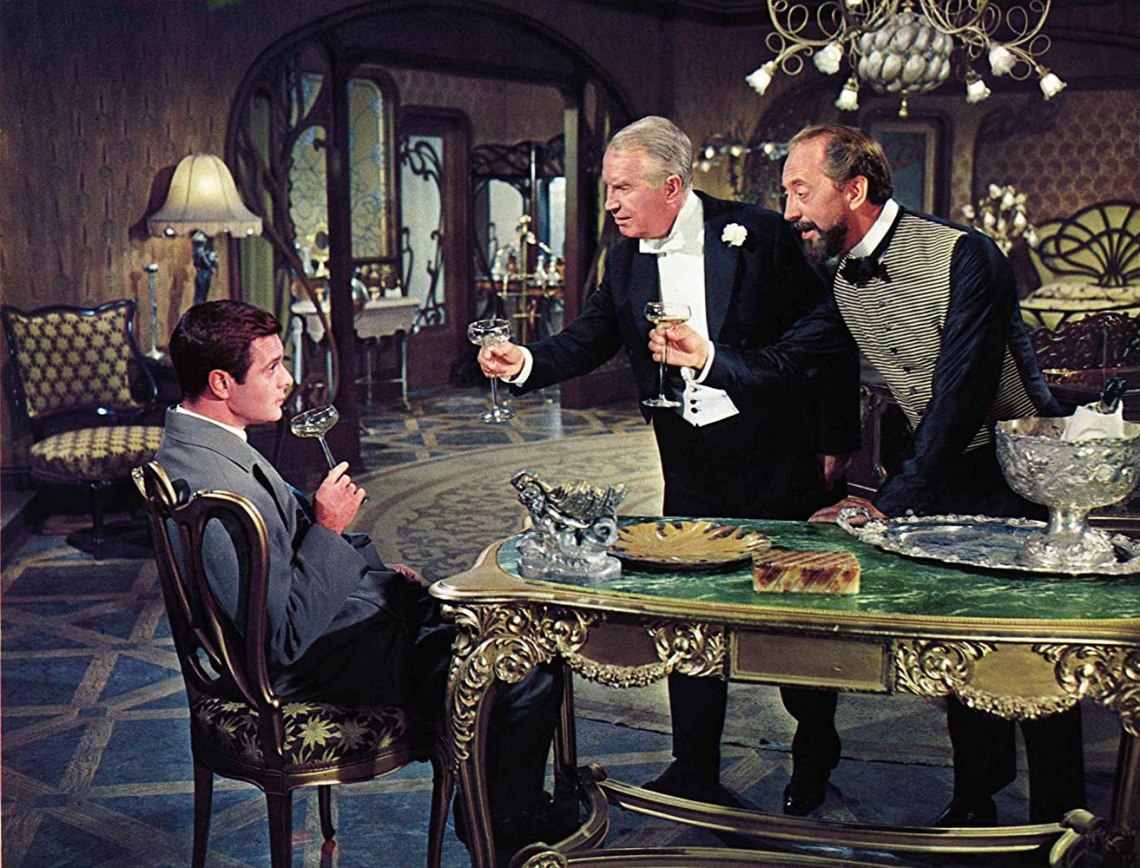
Hailed as many reviewers as being one of the best musicals of all time, even more than 60 years later, I expected Gigi to blow my socks off. In some ways it did, but in many ways, it didn’t. Gigi, which was based on a 1944 novella of the same name by Collette, tells the story of a rich and well-known Parisian playboy, Gaston (Louis Jourdan) and a 14-year old girl, Gigi (Leslie Caron) as they fall in love despite the out-dated social conventions surrounding their relationship.
At its core, Gigi is a tale about love, to be sure, but the film has aged like the finest of milk. From the start, Gigi is a tedious musical, wrapped in nostalgia, sexualization of teenage girls (see: pedophilia), and does nothing to convince me that my life is better for having watched it.
Now, for the rest of the movie.
Plot/Writing
The movie starts in Paris in 1900. We first see Honore Lachaille (Maurice Chevalier), an older, but wealthy Parisian playboy enjoying a beautiful spring day. Honore espouses the greatness of Paris at the turn of the 20th century. He then sings about how he likes little girls. This is where we are introduced to Gigi, a fierce and rebellious 14-year-old girl who lives with her mother and grandmother. Every week, Gigi is sent to her great aunt’s home to receive training to be a courtesan, which is a fancy word for a man’s mistress.
Gaston, Honore’s nephew, is introduced as a filthy rich playboy who is fed up with Paris society and wants more out of life. He believes that life is a bore for most of the film.
Gaston though, maintains a relationship with Gigi’s grandmother, as she was a courtesan for his uncle. This is the most valuable and truly fulfilling relationship in Gaston’s life. So, he already knows Gigi.
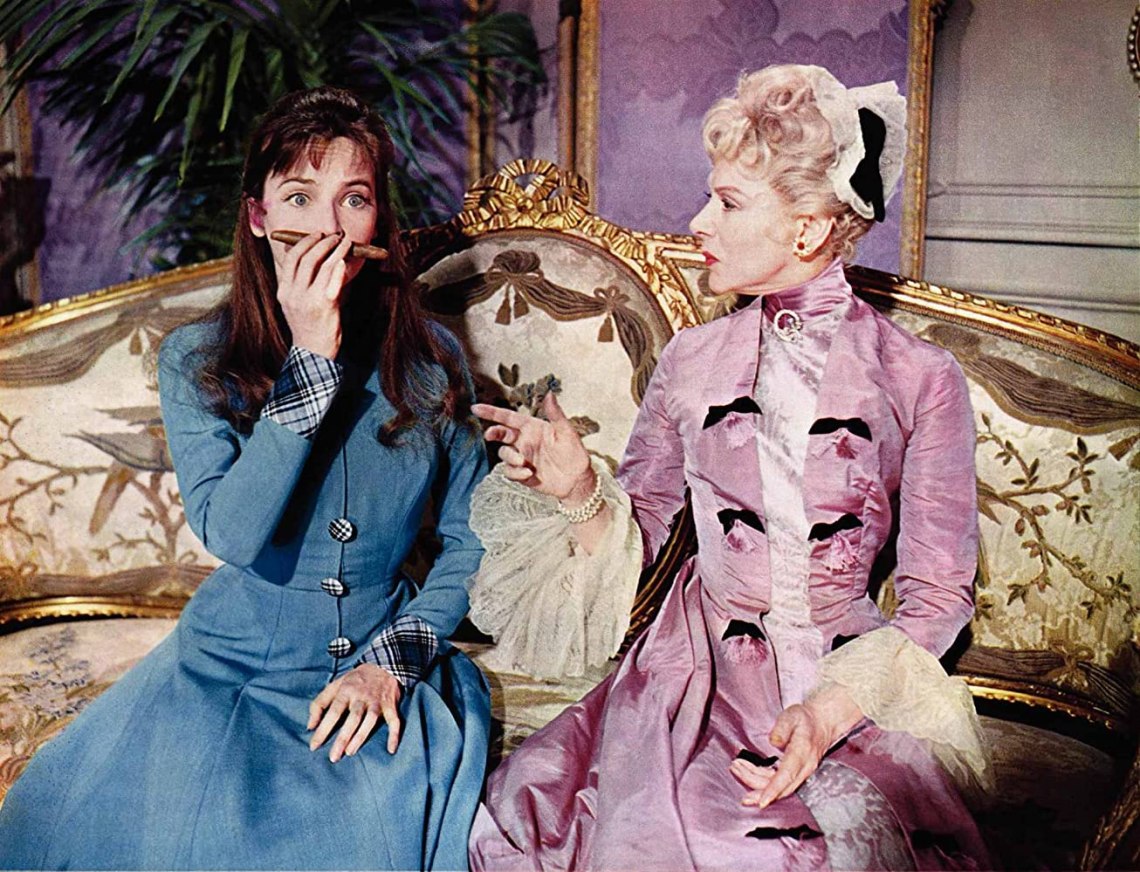
When Gaston loses a game of cards to Gigi, he promises to take her to the beach for a long weekend away. While at the oceanside, Gaston and Gigi begin to grow closer than they have before. This convinces Gaston to enter into a business partnership with Gigi. In other words, he wants her to be his mistress in a platonic way.
Initially written by Alan Jay Lerner, the screenplay won Best Adapted Screenplay at the 31st Academy Awards in 1959. In general, the writing is okay, full of witty one-liners and analogies for sex without actually mentioning it. The script is racy and the lyrics are catchy.
But, like Gaston’s life, Gigi is a bore. In the typical three-act structure of story-telling, Gigi fails to make an impact. In fact, act one is nearly 40% of the movie. After act one finally passes, that doesn’t mean the rest of the movie picks up. In fact, it’s a slog to get through even though, at only 115 minutes, it’s far from being one of the shortest films on this list.
The lyrics are great and very catchy, but that’s about it. Gigi failed to hold my attention throughout the film and at other times it’s downright infuriating. There is one scene in which Gaston breaks up with his current mistress and, as a result, she does not succeed at committing suicide. Honore and Gaston are next seen toasting to Gaston’s “first suicide” and looking forward to a future of many more. No, thank you. 0. 0.
Sound
Gigi won two Oscars for this category: Best Original Score (Andre Previn) whereas Lerner and Frederick Loewe won Best Original Song.
For the most part, I’m okay with the music in Gigi. Sure some of the numbers are rather dated and creepy (more on that below), but I found the musical numbers to be quite charming. Interestingly, there are fewer songs than An American in Paris, and even these songs are, in general, much shorter. There are no drawn-out dance numbers, no long verses. This is not a critique of the film. I may be grumpy about a lot of things, but the length and frequency of numbers in a musical are not one of them. I just found this to be an interesting observation. 1.
Set Design
Gigi also took home a pair of Oscars for this category: Best Art Direction and Best Costume Design.
The world in which Gigi resides is a full and colorful one, and under Minelli’s direction, the set design is truly one of the strongest parts of the film. Taking advantage of various Paris landmarks, Gigi brings a credible realism to the world of the movie.
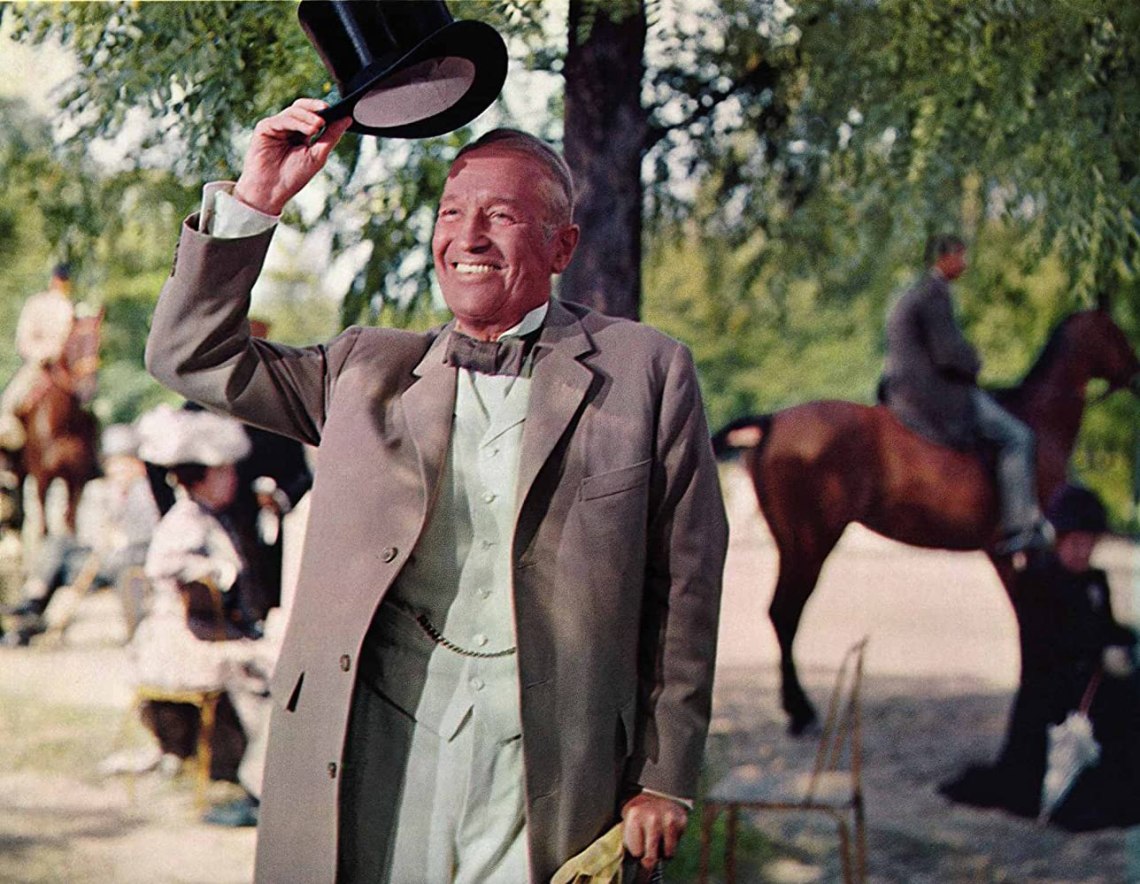
The costumes, though, are really where Gigi shines. Cecil Beaton took home the Academy Award for this category and a more deserving one I haven’t seen. Gigi’s world is full and colorful because of the people in it. The costumes are saturated with color, staining the brilliant Technicolor with their shades and into the back of my eyeballs. At one point, Laci and I were judging Gaston by his fashion choices as much as his actual actions in the movie. Not all his choices were great by our standards, but none of them were bad. 1.
Cinematography
Joseph Ruttenberg brought home an Oscar for Best Cinematography (Color) in 1959.
Perhaps the most interesting choice for this movie was the choice of shooting the film on Cinemascope. Normally reserved for the great epics, a la Lawrence of Arabia, Cinemascope was an odd decision, but not one that I disagree with. It certainly adds a “bigness” to the film, even if it does take place indoors. It adds great depth to each and every scene.
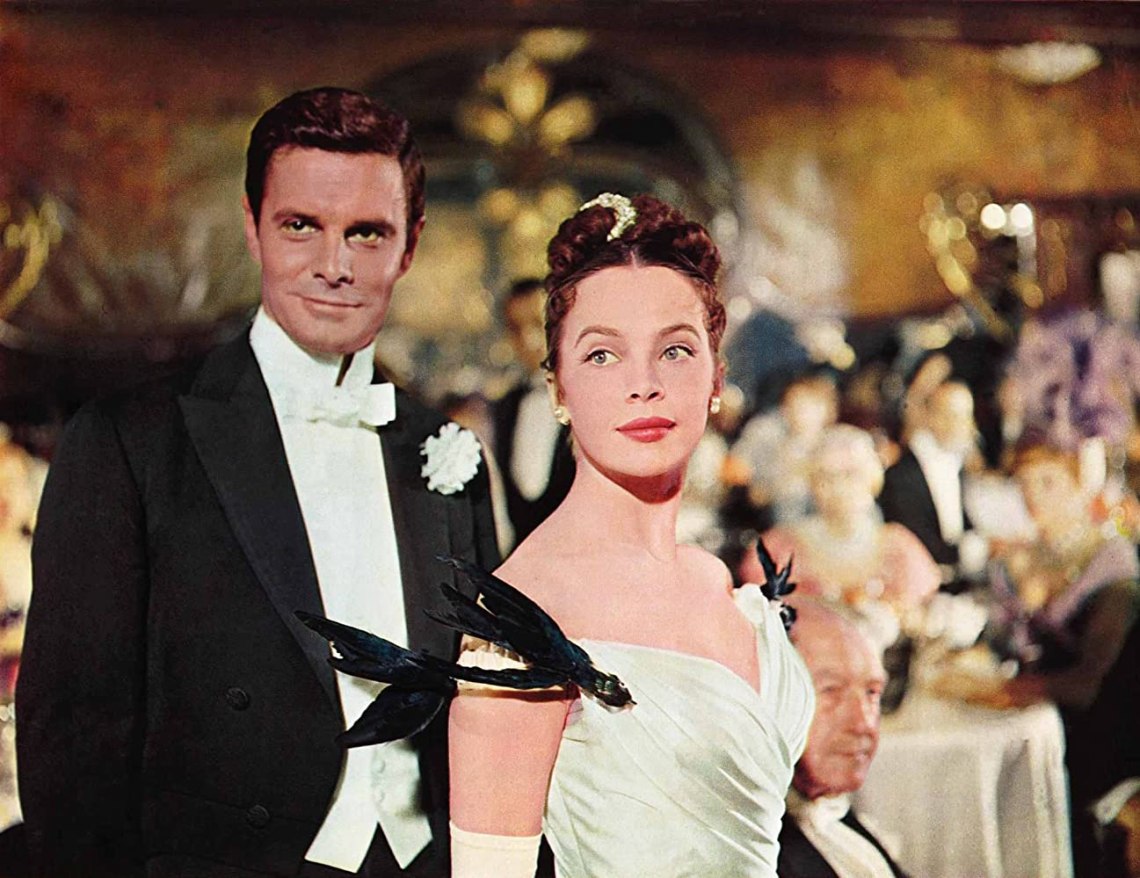
If you think of the space in front of the camera as a three-sided box, a constant challenge is conveying space and distance on a flat-screen. Cinemascope allows the audience to see the scope, depth, and distance in every shot and to see the layers of detail that reveal themselves in space. The only draw-back though, is there are very few close-ups as we may know them. There are almost no shots of people closer than the medium shot, or from about the belly button up. I didn’t miss the close-up though. Ruttenberg’s cinematography helps Gigi come alive. 1.
Acting
In the starring role of Gigi, we are once again introduced to the beautiful and graceful Leslie Caron. We last saw Caron in An American in Paris, making her movie debut in the other Vicente Minelli picture to win.
Caron, far from the innocent days of An American in Paris, spent seven years over the course of seven films honing her acting craft and it shows here, in Gigi. Caron’s outfits are not only vibrant but so is her personality. She’s playful in this film, which is not surprising when she’s playing a young girl. But Gigi is also ambitious, unrefined, and comfortable in her own skin.
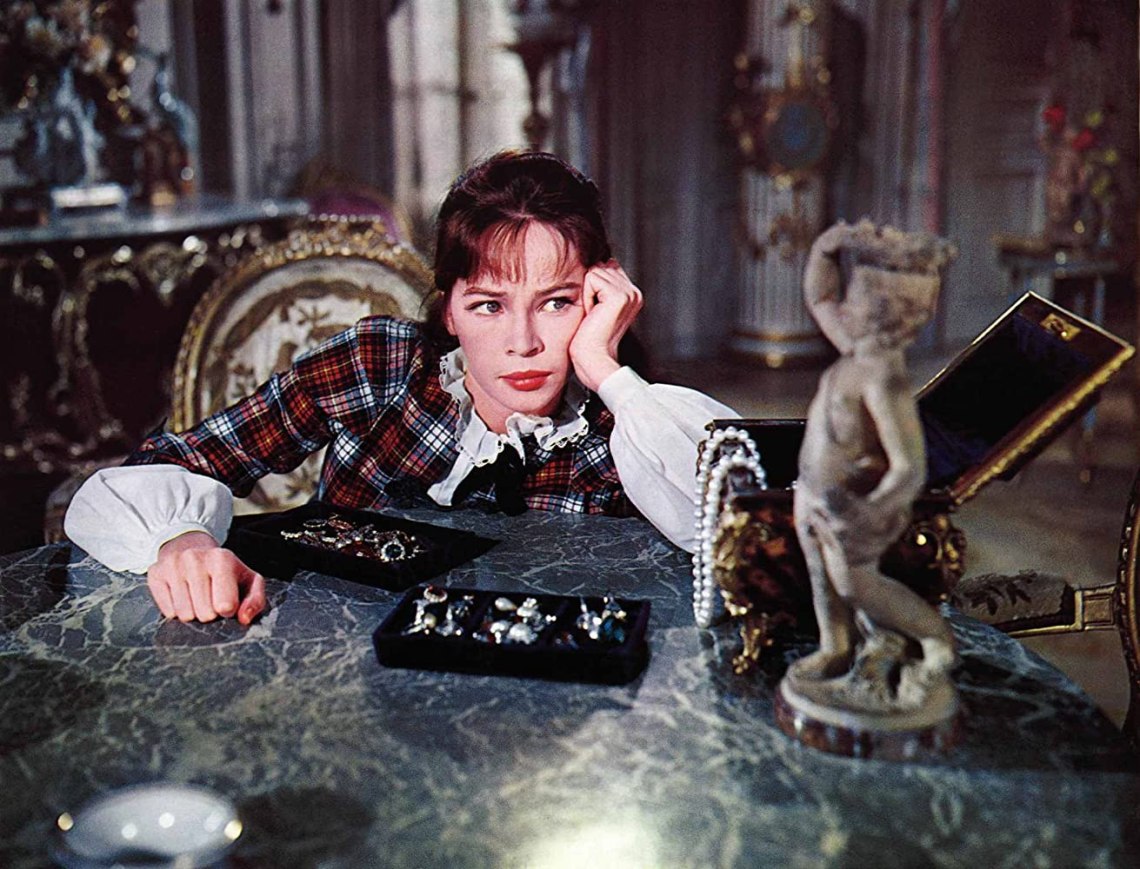
She’s learning to play the part of a courtesan only because she feels like she has no other option. Her rejection of the norms of “high-class” society is reasonable: she hates the snobbery, the looking-down-one’s-nose nature of the refined world.
On the other hand, the mind behind Caron’s stunningly brilliant blue eyes lacks a more pointed ambition about her life. However, I’ll forgive her for this. She’s 14.
While Caron was not nominated for an acting Oscar (none of the actors were), she does the best she can playing a girl half her age. The result, however, is believable but not totally convincing. It’s very hard for a twenty-eight-year-old woman to play that young.
On the other side of the coin is Louis Jourdan, who plays Gaston, a young, rich playboy. The overall anthem for Gaston is his song early in the film title “It’s a Bore.” This shows his frustration with the life he lives, the life with sporty cars, servers, a large mansion, and is the focus of the Parisian press. Gaston doesn’t realize that his life is the greener side of the fence.
He’s also a bore, too. Gaston is a one-dimensional jerk. He’s a man that, as seen above, celebrates when a woman attempts suicide on his behalf, ends relationships because a woman is allergic to flowers, and forces women to submit totally to his will while giving nothing in return. By the end of the film, he tries so hard to be likable that it makes me hate him even more.
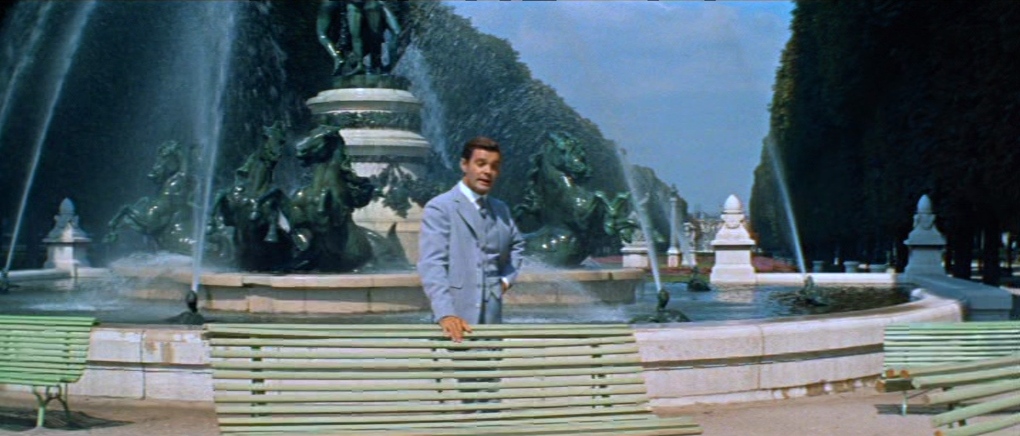
Gaston throws pity party after pity party for himself and then suddenly has a change of heart when he can’t even get a fourteen-year-old girl to be his mistress because he’s such a jerk.
Assigning a score to this category was very difficult because the two primary actors are such staunch opposites. However, I believe I will always remember Jourdan’s horrible character over Caron’s pretty good performance. Although, Gaston did have great fashion choices throughout. 0.
Directing
Vicente Minelli won Best Director for this film, one of the nine statuettes the movie took home in 1959. This was his second Best Director award.
It’s not really a secret by this point that Gigi was not my favorite film that I’ve seen. Not even my favorite from the 1950s. But that doesn’t mean that the film is just wrong from top to bottom. It’s not in the same category as Around the World in 80 Days or The Greatest Show on Earth. For one thing, Minelli’s emphasis on making every detail perfect is commendable. His dedication to the period and the world of Gigi is first-rate and even I can’t deny that.
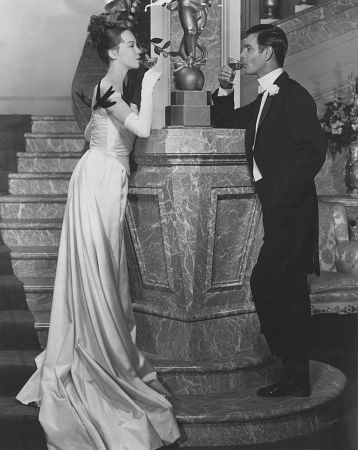
Second, even reviews of the day compared this film a lot to My Fair Lady. This is a reasonable comparison. Gigi smells a lot like the Pygmalion tale. While the similarities are there, comparing the two apples to apples is misleading and doesn’t capture the full scope of the film. Minnelli was able to create a film that can, and does, stand on its own when compared to My Fair Lady. But it’s interesting that I loved My Fair Lady and hated Gigi.
The first issue I have with this film is the blatant pedophilia on display. Many of the negative audience reviews out there tend to focus on Honore’s song “Thank God for Little Girls.” This is a reasonable criticism. The song, when performed by an old white dude is creepy to the core. However, I tend to roll my eyes at these criticisms for two reasons.
The first is that, and hear me out on this, it is possible to like children without being a pedophile. I know that’s a crazy idea, but it’s possible. I’ll give Lerner and Minelli the benefit of the doubt here, and believe that while the song is creepy today, it may have been less so when the film was produced. It was most likely innocent.
Second, the criticism of this song excludes the real pedophilia in the film: the relationship between Gaston and Gigi. Again Gigi is 14 while it’s unclear how old Gaston is. I think it’s reasonable to assume that relationships with 14-year-old girls were more common in 1900 than it is today. But it’s also reasonable to assume that they were an issue in 1958, too.
What gets me about Gigi is that no one questions the relationship in terms of age. The only question is if Gigi is actually ready to play the part of the courtesan in terms of training for societal pressures and etiquette. Gigi is the only one who questions the whole business of being a courtesan but only because she thinks she’d be miserable. While many reviewers, even today, believe that this is Gigi demonstrating some girl power and breaking through social stereotypes when, in reality she isn’t. Gigi is still constrained to narrow ideas of womanhood and feminity, meaning that she must be pure and must marry and bear children in order to be happy.
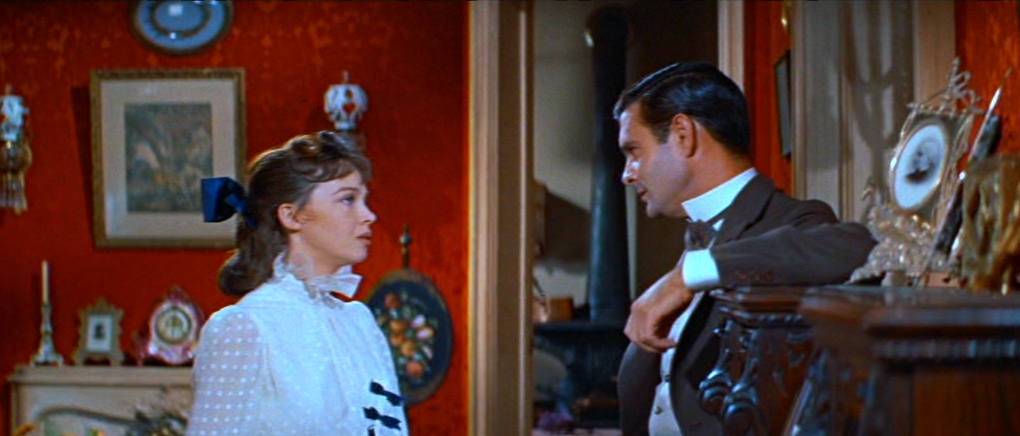
But these constraints on Gigi’s life are placed upon her at a very young age and she’s expected to share a bed with some rich dude until he’s done with her at the age of 14. That’s just not okay in my book.
While considering this film, I was reminded of Sam Mendes’s American Beauty from 1999. That story, too, features a relationship between a teenager and an older man. However, I gave that movie a pass when I reviewed it only because the relationship between Angela and Lester is not the point of the movie. There are many, many layers to American Beauty and many other points that Mendes was trying to make. In the grand scheme of things, the relationship between high-schooler and suburban dad was a side note in the movie, albeit the most shocking of the subplots within the film.
Gigi is not that way. The film, which again takes forever to develop, is literally all about the shift from a platonic relationship between an older playboy and a teenage girl into a more personal and intimate one. I don’t even mind that Gigi is being trained to be a courtesan. The age difference and the lack of objections are what is troubling to me.
Every other part of this film is really a satire of life in the Paris of 1900. It centers around rich Parisians offering a glimpse of a perfect life for them while ignoring all the troubles the Gilded Age caused poor and working-class families at the time. To this end, the film refuses to acknowledge anything other than the plight of the rich men in their struggles to overcome a boring life of taking rides on automobiles and hobnobbing with other rich jerks who only stick their noses in other people’s business. This is what separates Gigi from American Beauty. There is nothing in the film to truly represent history or the time the movie takes place despite it being a period piece. It glances over issues of the day that could have made the film much more dynamic, if not great. I spent 115 minutes of my life watching a relationship develop in an exceptionally tedious musical, and I’m convinced that Gigi is just escapist trash worthy of the dustbin of cinema history. 0.
Bonus Points
None.
Final Score: 3/10
Oscar Facts
Gigi won the 31st Academy Award for Best Picture on April 6, 1959 at the Pantages Theatre in Los Angeles. It beat out Auntie Mame, Cat on a Hot Tin Roof, The Defiant Ones, and Separate Tables for Best Picture. The award was presented by Ingrid Bergman and Cary Grant and accepted by the producer Arthur Freed. In total, Gigi won all nine awards it was nominated for, which was a record at the time for a clean sweep. That record would be broken the very next year by Ben Hur, before being broken again by The Lord of the Rings: The Return of the King.
David Niven won Best Actor, Susan Hayward won Best Actress, Burl Ives won Best Supporting Actor, and Wendy Hiller won Best Supporting Actress. The show was hosted by Jerry Lewis, Mort Sahl, Tony Randall, Bob Hope, Niven, and Laurence Olivier. David Niven is the only host in Oscar history to win an award during a ceremony he hosted.
Next Week
Next week, I’ll review Laurence Olivier’s Hamlet. After that, it’s Out of Africa, Ordinary People, Oliver!, Tom Jones and All the King’s Men.
